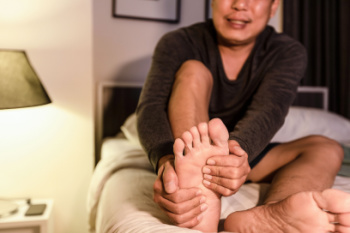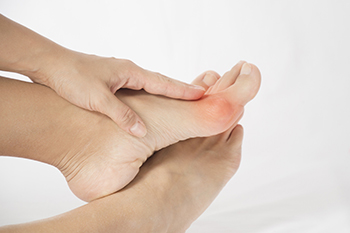(410) 764-7044
6506 Reisterstown Road, Baltimore
1205 York Road, Lutherville
6305 Belair Road, Baltimore
7809 Wise Avenue, Dundalk

Your feet are constantly sending messages to your brain, about temperature, pain, and pressure, until one day, they do not. Foot neuropathy occurs when nerve damage disrupts these signals, leading to numbness, tingling, burning pain, or even a complete loss of sensation. For some, it starts subtly, like pins and needles that come and go. For others, it is sharp, electric-like pain that worsens at night. Diabetes is a major cause, but injuries, infections, chemotherapy, and even vitamin deficiencies can trigger nerve damage. The danger in this is that without feeling pain, small cuts or pressure sores can go unnoticed, leading to serious complications. There is no quick fix, but early intervention helps slow progression. Managing underlying conditions, improving circulation, and using protective footwear can reduce discomfort. If your feet feel different than they used to, it is suggested that you see a podiatrist for evaluation and appropriate treatment.
Neuropathy
Neuropathy can be a potentially serious condition, especially if it is left undiagnosed. If you have any concerns that you may be experiencing nerve loss in your feet, consult with one of our podiatrists from Plaza Podiatry. Our doctors will assess your condition and provide you with quality foot and ankle treatment for neuropathy.
What Is Neuropathy?
Neuropathy is a condition that leads to damage to the nerves in the body. Peripheral neuropathy, or neuropathy that affects your peripheral nervous system, usually occurs in the feet. Neuropathy can be triggered by a number of different causes. Such causes include diabetes, infections, cancers, disorders, and toxic substances.
Symptoms of Neuropathy Include:
- Numbness
- Sensation loss
- Prickling and tingling sensations
- Throbbing, freezing, burning pains
- Muscle weakness
Those with diabetes are at serious risk due to being unable to feel an ulcer on their feet. Diabetics usually also suffer from poor blood circulation. This can lead to the wound not healing, infections occurring, and the limb may have to be amputated.
Treatment
To treat neuropathy in the foot, podiatrists will first diagnose the cause of the neuropathy. Figuring out the underlying cause of the neuropathy will allow the podiatrist to prescribe the best treatment, whether it be caused by diabetes, toxic substance exposure, infection, etc. If the nerve has not died, then it’s possible that sensation may be able to return to the foot.
Pain medication may be issued for pain. Electrical nerve stimulation can be used to stimulate nerves. If the neuropathy is caused from pressure on the nerves, then surgery may be necessary.
If you have any questions, please feel free to contact our offices located in Baltimore, Lutherville, and Dundalk, MD . We offer the newest diagnostic and treatment technologies for all your foot care needs.

Bunions are bony bumps that form at the base of the big toe, where the joint sticks out as the tip of the toe angles toward the second toe. This misalignment can make the foot appear uneven and swollen. The skin over the bump may be red and inflamed, and the area can be tender, especially when pressure is applied, such as when wearing shoes. The pain may worsen over time and become constant, especially in tight footwear. Bunions are more common in women, particularly those who wear high heels or narrow shoes, but they can also develop due to genetics, abnormal foot mechanics, or conditions like arthritis. Other factors include flat feet or a history of foot injuries. A podiatrist can help by evaluating the bunion and recommending treatment, including custom orthotics, padding, or adjustments in footwear. In more severe cases, surgery may be required to correct the alignment of the toe. If you have a painful bunion, it is suggested that you schedule an appointment with a podiatrist.
If you are suffering from bunions, contact one of our podiatrists of Plaza Podiatry. Our doctors can provide the care you need to keep you pain-free and on your feet.
What Is a Bunion?
A bunion is formed of swollen tissue or an enlargement of boney growth, usually located at the base joint of the toe that connects to the foot. The swelling occurs due to the bones in the big toe shifting inward, which impacts the other toes of the foot. This causes the area around the base of the big toe to become inflamed and painful.
Why Do Bunions Form?
Genetics – Susceptibility to bunions are often hereditary
Stress on the feet – Poorly fitted and uncomfortable footwear that places stress on feet, such as heels, can worsen existing bunions
How Are Bunions Diagnosed?
Doctors often perform two tests – blood tests and x-rays – when trying to diagnose bunions, especially in the early stages of development. Blood tests help determine if the foot pain is being caused by something else, such as arthritis, while x-rays provide a clear picture of your bone structure to your doctor.
How Are Bunions Treated?
- Refrain from wearing heels or similar shoes that cause discomfort
- Select wider shoes that can provide more comfort and reduce pain
- Anti-inflammatory and pain management drugs
- Orthotics or foot inserts
- Surgery
If you have any questions, please feel free to contact our offices located in Baltimore, Lutherville, and Dundalk, MD . We offer the newest diagnostic and treatment technologies for all your foot care needs.

An Achilles tendon injury occurs when the tendon that connects the calf muscles to the heel becomes strained, inflamed, or torn. This tendon plays a vital role in walking, running, and jumping. Injuries may develop gradually due to repetitive stress or suddenly from excessive force. Common causes include overuse, wearing improper footwear, sudden increases in physical activity, and inadequate warm-ups before exercise. Engaging in high-impact activities, such as basketball or running, can place significant strain on the tendon. Having tight calf muscles or structural foot imbalances may also contribute to added stress on the tendon. If you experience pain in the lower part of your calf, it is suggested that you consult a podiatrist who can accurately diagnose and provide appropriate treatment for Achilles tendon injuries.
Achilles tendon injuries need immediate attention to avoid future complications. If you have any concerns, contact one of our podiatrists of Plaza Podiatry. Our doctors can provide the care you need to keep you pain-free and on your feet.
What Is the Achilles Tendon?
The Achilles tendon is a tendon that connects the lower leg muscles and calf to the heel of the foot. It is the strongest tendon in the human body and is essential for making movement possible. Because this tendon is such an integral part of the body, any injuries to it can create immense difficulties and should immediately be presented to a doctor.
What Are the Symptoms of an Achilles Tendon Injury?
There are various types of injuries that can affect the Achilles tendon. The two most common injuries are Achilles tendinitis and ruptures of the tendon.
Achilles Tendinitis Symptoms
- Inflammation
- Dull to severe pain
- Increased blood flow to the tendon
- Thickening of the tendon
Rupture Symptoms
- Extreme pain and swelling in the foot
- Total immobility
Treatment and Prevention
Achilles tendon injuries are diagnosed by a thorough physical evaluation, which can include an MRI. Treatment involves rest, physical therapy, and in some cases, surgery. However, various preventative measures can be taken to avoid these injuries, such as:
- Thorough stretching of the tendon before and after exercise
- Strengthening exercises like calf raises, squats, leg curls, leg extensions, leg raises, lunges, and leg presses
If you have any questions please feel free to contact our offices located in Baltimore, Lutherville, and Dundalk, MD . We offer the newest diagnostic tools and technology to treat your foot and ankle needs.





